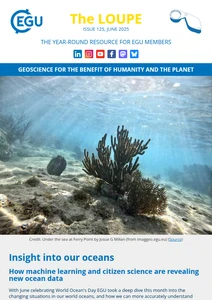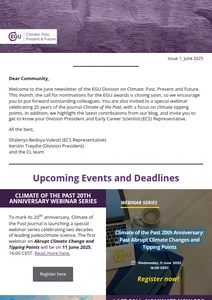President: Kerstin Treydte
(Emailcl@egu.eu)
Deputy President: Gabriele Messori
(Email)
ECS Representative: Shalenys Bedoya Valestt
(Emailecs-cl@egu.eu)
The Division on Climate: Past, Present & Future (CL) is one of the larger divisions of the European Geosciences Union. It pools from many disciplines and consequently has many co-organised sessions with other divisions at the EGU General Assembly. The division is very interdisciplinary and covers climate variations on all time scales. CL includes the study of any kind of climate archive from rocks to ocean cores, speleothems, ice cores, chronicles, to instrumental records to name a few. Besides observations, climate modelling on all time scales from the deep past to the future are areas covered by the division. Any aspect of the climate system falls into the realm of the division e.g. atmosphere, ocean, biosphere, cryosphere, and geology. Themes focus on the climate on Earth but may also expand other planets or the Sun.
Latest posts from the CL blog
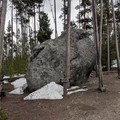
The rabbit and the tortoise – what does a glacial cycle need to be a glacial cycle?
The climate is not what it used to be and it will never be the same again. This is what the models say. Where does this knowledge come from? In short, we learn it from the clues that nature left on the planet since its formation. And it is precisely with these observations where our story begins. Since the beginnings of mountaineering, many visitors of the Alps and other mountain ranges have wondered why huge boulders (Figure 1) were left …
Read more
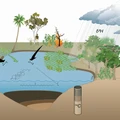
Early farmers of the Pacific recorded in sediment cores from Vanuatu
The Pacific Ocean is a vast expanse that is punctuated by diverse islands and archipelagos. Some of these islands closer to Asia and the Australian landmass have been home to humans for tens of millennia. Others – spread across Micronesia, Melanesia, and Polynesia – make up Remote Oceania and were only settled by humans within the past few thousand years. Archeological investigations have provided valuable insights into the history of human settlement of Remote Oceania, but much remains unknown about …
Read more
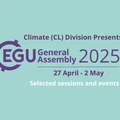
Final guide to get ready for EGU25 with the Climate Division!
Dear climate community, With the EGU General Assembly 2025 approaching (27 April – 2 May), it is time to start preparing your programme and planning your week. We’re looking forward to another exciting and engaging General Assembly — a unique opportunity for geoscientists across career stages to present their research, exchange ideas, and expand their network. As usual, the Austria Center Vienna will be hosting more than 19,000 presentations (orals, posters, and PICOs). Whether you are a long-time attendee or …
Read more
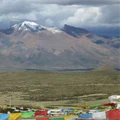
Recent awardees

The 2025 Hans Oeschger Medal is awarded to
Heather Marie Stoll for pioneering contributions in both marine and terrestrial palaeoclimate research, which led to groundbreaking advancement in our understanding of rapid climate change, through forcings and feedbacks.
Read more

- 2025
- Milutin Milanković Medal
The 2025 Milutin Milanković Medal is awarded to
Zhengyu Liu for outstanding contributions to our understanding of global climate change by combining theoretical approaches, the development and use of a hierarchy of models, and model-data comparisons.
Read more

- 2025
- Division Outstanding Early Career Scientist Award
The 2025 Division Outstanding Early Career Scientist Award is awarded to
Kai Kornhuber for outstanding research on extreme weather and climate dynamics, including circumglobal patterns in the jet stream, their relation to heatwaves and food security, and representation in climate models.
Read more

The 2024 Hans Oeschger Medal is awarded to
Michael Sigl for his innovative contributions, which improved ice core chronologies and illuminated the impacts of volcanic eruptions on climate and societies.
Read more

- 2024
- Milutin Milanković Medal
The 2024 Milutin Milanković Medal is awarded to
Peter U. Clark for exceptional contributions to reconstructing and understanding how the past climate, ice sheets and sea level responded to perturbations, with a perspective on future committed changes.
Read more

- 2024
- Division Outstanding Early Career Scientist Award
The 2024 Division Outstanding Early Career Scientist Award is awarded to
Maria A. A. Rugenstein for outstanding research in climate dynamics and the ocean’s influences on atmospheric feedbacks.
Read more

- 2024
- Outstanding Student and PhD candidate Presentation (OSPP) Award
The 2024 Outstanding Student and PhD candidate Presentation (OSPP) Award is awarded to
Dánae Sanz Pérez Paleoenvironmental and paleoecological changes during the early GABI in the Argentine Pampas: a stable isotope approach
Read more

- 2024
- Outstanding Student and PhD candidate Presentation (OSPP) Award
The 2024 Outstanding Student and PhD candidate Presentation (OSPP) Award is awarded to
Laura Detjen Heavy and extreme precipitation events in the Sichuan Basin during the 2020 summer season in a set of kilometre-scale simulations
Read more

- 2024
- Outstanding Student and PhD candidate Presentation (OSPP) Award
The 2024 Outstanding Student and PhD candidate Presentation (OSPP) Award is awarded to
Laura Schild Richness asymmetry with past forest loss and gain in pollen data
Read more

- 2024
- Outstanding Student and PhD candidate Presentation (OSPP) Award
The 2024 Outstanding Student and PhD candidate Presentation (OSPP) Award is awarded to
Meike D. W. Scherrenberg Simulating the ice-sheets during the Mid-Pleistocene Transition: A dance of ice, CO2 and orbital cycles
Read more
Current issue of the EGU newsletter
Current issue of the CL division newsletter
Updates from the Climate: Past, Present and Future Division – June Edition
This month, we bring you the latest updates from the CL Division. The nomination deadline for the 2026 EGU Awards and Medals is approaching on 15 June — we strongly encourage you to recognise excellence within our community. You are also invited to a special webinar celebrating 20 years of the journal Climate of the Past, with a focus on climate tipping points. We also feature recent contributions from the CL Blog, invite you to get to know the Division President and Early Career Scientist Representative, and more in this issue!
Read more















